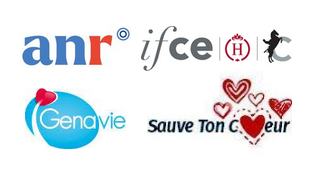Cardiac physiology and pharmacology
Benjamin Lauzier, Marja Steenman, Bertrand Rozec & Chantal Gauthier
Investigator : Manon Denis, Chantal Gauthier, Benjamin Lauzier, Aurélia Leroux, Marja Steenman, Bertrand Rozec
PhD students : Charlotte Betus, Martin Bouaud, Yann Daniel, Jérôme Dauvergne, Matthieu Rivière, Amandine Vergnaud
Support staff : Angélique Erraud, Morteza Erfanian, Imen Fellah, Eva Papin
The primary objective of our group is to improve patient outcome in shock situation. Taking advantage of our in vivo and ex vivo technics, such as isolated working heart, PV loop, high throughput screening technics, we have been developing new concept to develop treatment for acute cardiac decompensation during shock. We have a particular focus on O-GlcNAc, a particular post-translational modification involved in cell response to stress and metabolic modification.
-
hErOiSmE project
Shock situations (whether hemorrhagic or septic) share common pathophysiological mechanisms (implementation of inflammatory processes, cardiovascular failures, hypoperfusion of peripheral organs, etc.) that require rapid and appropriate management. They are both associated with high morbidity and mortality with a cost to society that increases each year. Unfortunately, the available treatments are very limited and mainly target symptoms. All recent studies have failed, we are facing a therapeutic impasse. It is therefore urgent to develop new strategies for new targets. In this context, our project aim to develop new approaches. In collaboration with JC Chatham (University of Birmingham, Alabama, US), we have developed an approach to stimulate O-GlcNAcylation in hemorrhagic shock or septic shock. O-GlcNAcylation is a post-translational modification responsible for cell survival that plays a major role in the cell response to stress. The approaches developed by our two teams aim to increase O-GlcNAc levels very early on, and are associated with a significant reduction in stress markers, an improvement in cardiovascular function and a significant reduction in mortality in both types of shock. These studies demonstrate that the stimulation of O-GlcNAcylation has significant therapeutic potential for patient survival and on the battlefield to limit the damage associated with shock situations.
The consortium, supported by the ANR, has been built with the chemists of the Ceisam team (univ Nantes), JC Chatham and our team IIb will enable us to develop a stable molecule, injectable intramuscularly or intravenously with targeting properties. With this funding, we hope to ensure its safety and validate its efficacy at different times / dose in order to quickly offer injectable treatment to patients and on the battlefield to reduce the morbidity and mortality associated with hemorrhagic and septic shock.
-
O-GlcNac as a new target for cardiac decompensation
O-GlcNAc is a post-translational modification with a central in cellular homeostasis, yet its role is not fully understood. We have built a consortium (Luc Bertrand, UCL, Belgium, Tarik Issad, Cochin Paris, Yan Burelle and Christine Des Rosiers Canada, Emilie Camberlein, Nantes) of researchers interested in this particular post-translational modification to decipher the role of this modification in pathophysiological condition. We have demonstrated in rat that this modification is strongly modified during the post-natal development in rat and we are building a cohort of samples from patient (CHANCE) of different age to validate this observation in human. Our data strongly suggest that this modification is of potential interest in many acute situations.
-
Preclinical development
Thanks to a collaboration with Inflectis Biosciences we have developed a model a extracorporeal circulation to study the impact of SIRS (systemic inflammatory response syndrome) on cardiovascular function to develop new treatments.
Learn more about our projects
- ANR HEROISME 2 : Benjamin Lauzier (2023-2026)
- ANR hErOiSmE : Benjamin Lauzier (2020-2024)
- ANR ED-HFpEF : Benjamin Lauzier (2019-2024)
Beneficial Effects of O-GlcNAc Stimulation in a Young Rat Model of Sepsis: Beyond Modulation of Gene Expression. Dupas T, Persello A, Blangy-Letheule A, Denis M, Erraud A, Aillerie V, Leroux AA, Rivière M, Lebreton J, Tessier A, Rozec B, Lauzier B. Int J Mol Sci. 2022 Jun 9
An O-GlcNAcylomic Approach Reveals ACLY as a Potential Target in Sepsis in the Young Rat. Denis M, Dupas T, Persello A, Dontaine J, Bultot L, Betus C, Pelé T, Dhot J, Erraud A, Maillard A, Montnach J, Leroux AA, Bigot-Corbel E, Vertommen D, Rivière M, Lebreton J, Tessier A, Waard MD, Bertrand L, Rozec B, Lauzier B. Int J Mol Sci 2021
O-GlcNAc stimulation: A new metabolic approach to treat septic shock. Ferron M, Cadiet J, Persello A, Prat V, Denis M, Erraud A, Aillerie V, Mevel M, Bigot E, Chatham JC, Gauthier C, Rozec B, Lauzier B. Sci Rep. 2019 Dec
AMPK activation counteracts cardiac hypertrophy by reducing O-GlcNAcylation. Gélinas R, Mailleux F, Dontaine J, Bultot L, Demeulder B, Ginion A, Daskalopoulos EP, Esfahani H, Dubois-Deruy E, Lauzier B, Gauthier C, Olson AK, Bouchard B, Des Rosiers C, Viollet B, Sakamoto K, Balligand JL, Vanoverschelde JL, Beauloye C, Horman S, Bertrand L. Nat Commun. 2018 Jan
Funding
- Agence Nationale pour la Recherche
- Genavie
- Institut Français du Cheval et de l’Équitation
- Sauve Ton Cœur






